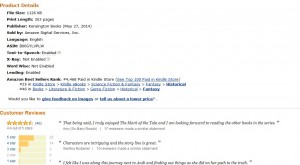 I’m over at the Contemporary Romance Cafe, discussing a big surprise about going to writing full time.
I’m over at the Contemporary Romance Cafe, discussing a big surprise about going to writing full time.
Tag: money
Dreaming Big – How Much Money is Super Big Money?
 I’m over at Word Whores, crowing about THE MARK OF THE TALA being #25 in Fantasy, right up there with George RR Martin, and indulging in big dreams of what I’d do with his kind of money.
I’m over at Word Whores, crowing about THE MARK OF THE TALA being #25 in Fantasy, right up there with George RR Martin, and indulging in big dreams of what I’d do with his kind of money.
Fantasies and Determinations
 When I submitted my first novel to an agent, I spun this whole fantasy around it.
When I submitted my first novel to an agent, I spun this whole fantasy around it.
Yeah, you publishing types out there are rolling your eyes and you writers are cringing and nodding in sympathy.
You know the kind of fantasy I mean. The agent calls you up, all thrilled and excited to have discovered you. I’m embarrassed to admit, part of my little fantasy was that not only would they offer me a lovely advance, but that they’d ask me how much more I needed to quit my day job and write the sequel as fast as possible.
Yes, you can laugh now.
I wasn’t all that naive, either, relatively speaking. I’d had my essay collection published with a university press, which meant no advance, small print run. I’d published in magazines for ten years. I had a pretty decent idea how publishing worked.
This still did not prevent me from imagining they’d go into a frenzy, exclaiming “She’s the next Stephenie Meyer – we must pay this woman to write!”
It could happen…
At any rate, it didn’t. I got the polite thanks, but no thanks. David took me to the bar and bought me a margarita. Since then I’ve had more rejections and some maybes and some lovely yeses. But no one is begging me to quit my day job.
One of the things I’ve come to realize, in my newfound maturity, is that no one ever will.
At RT I noticed how many authors referenced their day jobs. Even award-winning, best-selling authors with name-recognition and sizzling cache. Courtney Milan, for example, still works full-time as a lawyer. A lot of us would like our books to be doing as well as hers. A number of other authors have a spouse who pulls in a decent salary, so the writing money is gravy on top of that.
The reality of it is, a day job provides a number of things that advances and even decent royalties do not. Things like health insurance, 401Ks, and a reliable salary. Advances are finite. You get a chunk of money and you might not get another for six months or a year. An author doing really well might get a $10,000, but if you compare that to half your annual salary at your day job, not counting benefits, it’s not so much. Royalties fluctuate and are impossible to predict. In order to rely on writing income, you have to have enough of an established backlist – books that keep selling more or less on their own at a steady rate.
I’m obviously not the first person to point that out. But it recently occurred to me that this is much like the scenario laid out by people like Robert Kiyosaki of Rich Dad, Poor Dad fame. You gradually build your passive income – money from investments that pay out without you having to actively work on them, e.g., already published books vs. writing new books – until you reach a level of comfort. For many of us, this level of comfort includes being able to pay for health insurance and save for the future.
It’s back to the whole “slow and steady wins the race thing.” It’s not the glamorous fantasy, no. It’s good to have those dreams, I think. They keep us revved and excited. It’s also good to recognize the reality, and plan accordingly.
Wait! Is that the phone?
Yo Ho Ho and a Bottle of Karma
 Okay, I’m going to take a leap and say something that no one will like or agree with.
Okay, I’m going to take a leap and say something that no one will like or agree with.
Oh, wait – I do that all the time.
Anyhoo…
I don’t think book pirates are such a big deal.
Yes, pirates offer Petals & Thorns for free download – I’ve seen the links from Google Alerts. No, I don’t go look at them. I don’t send take down letters. I don’t mention it on Twitter or really give it much thought at all.
This is why:
I think I’ve said before here, that if I were asked to put a name to my religious/spiritual affiliation, I’d say I am a Taoist. I believe in individual responsibility, that we reap what we sow, that what goes around comes around. Everything is about the exchange of energy, the natural balance of the universe.
Money is only a symbol, really. Our paper and electronic dollars in the US are based on gold. (Yeah, I know – not so much anymore. We won’t go there.) Gold is pretty; it makes for nice jewelry, but really it has no intrinsic value. Gold won’t keep you alive in a blizzard. However, because we all agreed at some point in time that gold is nifty stuff, you could trade some of your gold to live in a warm hut someone else built and cook some meat from a rabbit someone else killed over a fire burning wood someone else cut.
Of course you could go out and do all these things yourself: you could cut wood, build a hut and stack firewood next to it. You could kill and clean your rabbit and cook it over the fire (or your carrots, whatever). If you don’t have time to do all that, or if you really suck at snaring bunnies or digging up carrots, you can trade with someone else. Over time, we substituted tokens in lieu of direct trade: I’ll give you this piece of gold (or vial of salt or packet of saffron) which you can give to someone else for whatever they have that you want.
So, for a storyteller, someone gives us tokens so we can keep fed and housed while we sit at home and make up stories.
Yes, I hear you now. If people steal your stories, then you can’t keep fed and housed. It’s much easier, I freely admit, for someone like me who’s getting a pile of gold tokens for other work I do. I don’t depend on those stories to keep me alive yet.
The way I think of it is, money is just a stand-in for the exchange of energy. A balance of their efforts and mine. If someone downloads my story, reads it and loves it, then I believe that they do pay me. They send little happy feelings of gratitude out into the universe for me. Can I quantify this? Of course not. Is it still valuable to me? Yes yes yes.
I believe that we all know, on some visceral or spiritual level, what we owe to other people. And I believe we’re driven to repay it, on whatever level we can. Sometimes it’s a pay-it-forward thing. The good feelings I generate in one person gets passed on to someone else, who then passes it along. I get paid in thousands of ways in all the tiny blessings of life.
Are there jerks out there who just take? Of course there are.
But, I’ve learned in life, as I’m sure most of you have, that people will do nasty stuff to us that we may never see justice for. I’ve had my share of people undermining me, stabbing me in the back, what have you. I’ve been involved in court cases where I paid money to people who didn’t deserve it, simply to extricate myself from the situation. We all have.
And we all have to find a way to let that stuff go, or it poisons us.
I believe in Karma. I trust that the universe will take care of it. One of the people who’s wished me the most ill in this world is a miserably unhappy person. It’s sad, but I also think that’s what happens.
We all get back what we put out into the world. I truly believe that. The best part is, the universe tracks this for me, so I don’t have to.
I just sit in my little hut and write the stories.
Back In My Day…
I read a fair number of blogs about writing, reading and the publishing industry.
No surprise there.
If you read a lot of these blogs, you’ll notice that there are certain themes people like to return to. One of the favorite ones is how unlikely you are to make money as a writer. I wanted to add the phrase “especially lately.” It’s true that the economic downturn has people focused on money and lack thereof, but I’ve been hearing this lecture since I started writing back in the late 90s.
Exhibit A: http://pimpmynovel.blogspot.com/2010/07/you-aint-in-it-for-money.html. I generally like this guy’s blog, but what he’s saying about keeping the day job is pretty standard. You might make some money, but not enough to live on, is the message. At the same time, the big news last week was that Janet Evanovitch, author of the wildly successful Stephanie Plum series, now up to 16 books, asked for $50 million for her next four books. Well, her agent, who is also her son, asked for it. Same thing? I was shocked by this number until an editor on Twitter told me Evanovitch got $40 million for the previous four.
Still, she says, that’s a raise of $2.5 million per book, which is asking a lot in this economy.
So, I’m going to leave alone the concept that someone who’s already received $40 million could then want another $50 million. This is a world I don’t live in. I understand this gets to be like movie stars, where prestige rests on the price tag. I just keep thinking that once I buy the beach house in the Caribbean, what would I do with the rest of the money?
But that’s neither here nor there.
I’m wondering where the middle is?
There must be something besides “you won’t make enough to live on” and “I need $12.5 million per book.” The zone gets fuzzy because everyone thinks they need a different amount of money to live on, but still…
For most writers, the goal is to make enough money to ditch the day job and write full time. This seems like a reasonable ambition. After all, nobody practices law on the side while working as a checker at the grocery store. Nobody tells you when you go into environmental consulting that you should really plan on just enjoying it as a hobby that supplements your real income.
I’m beginning to suspect this is a bit of a “stay away” gambit. Well-meaning, perhaps, but I think a lot of these writers are seeing their pool glutted. Especially the ones who aren’t making enough money to live on. I’ve never heard Nora Roberts or Janet Evanovitch give this cautionary tale. In fact, I once heard Anne Rice announce that she was getting something like $1 million for her next book (I know – Janet was giggling) and that if she could do it, anyone could.
The upshot is: I’m tired of this particular saw and I don’t intend to listen anymore.
Our finances are good. I pay attention to where my money comes from and where it goes. We have no appreciable debt beyond our mortgage, which is solid because we bought at the bottom of the market. I know what I need to live on and what’s gravy. I think that’s just being financially savvy. We should all know where we stand and what we need. From there it’s perfectly reasonable to set income goals from our writing.
It’s not magic; it’s just being smart.
Death and Taxes
Quite the thunderstorm rolled through here yesterday.
After quiet snowfall since December, the fury of the storm startled us. Lighting whipped out booming thunder. Rain and hail pounded on the roof and skylights with equal fury. In the way of Spring, the squalls passed through, ominous dark giving way to sunshine, until the next row of boomers passed over.
Yesterday a well-known, and generally regarded as successful, literary agent was tweeting that she needs a second job. She said that people don’t understand how literary agents do and don’t make money because the association rules forbid that transparency. But she asserted that agents in their first five years don’t make any money.
I wouldn’t know.
But I do know she works for a large literary firm that theoretically should pay her some kind of salary or wage. I suspect they also work for commission and that, over time, those commissions are where agents really start bringing in the bigger dollars. I suppose it’s possible that her agency doesn’t pay her a living wage. New York City is certainly massively expensive to live in, so a “living wage” means something totally different there.
The thing is, when people start talking about how much money they need to live, that could mean anything at all.
I follow this one blog from time to time, called Debt Kid. It used to be all about the one guy, who tanked himself financially doing day-trading and how he turned his life around and climbed out of truly enormous debt ($300K+).
(As a total aside, I don’t like the blog nearly as much now. He brought in other people to blog about their out-of-debt journeys. I don’t “like” all of them. Their voices and stories don’t speak to me. I only bring this up because I notice this with group blogs — I don’t really like it when the blog I visit isn’t the person I like to “hear.” Something to keep in mind, anyway.)
At any rate, sometimes there’s still interesting stuff and he recently posted about how where you live affects your spending habits more than anything else. Not the city, but the neighborhood. There was an article out at about the same time on tax breaks and discussing how people making upwards of $500K/year can complain that they can’t possibly afford to take a greater tax hit. Those people truly believe that. Of course, their expenses are high. And if all of their neighbors are making $1 million/year, then they are the poor folk of the neighborhood.
It’s an interesting thing to me: how much money is enough. The Tony Robbins money-making movement is based on the idea that if you’re not making more money this year than last year, then you are essentially dying. In that view of the world, a person either grows or dies. And once the trajectory moves downward, it’s very difficult to reverse, if not impossible. A personal and financial death spiral.
Which is just absurd.
I think, anyway.
Fight Club (Chuck Palahniuk) was a good book and a good movie partly because it addressed the idea of stuff owning you, rather than the other way around. It also showed that you can always walk away from it. People only have to have what they think they have to have.
Seasons are cyclical. The winter gives way to the tumult of Spring. Storms hit and move on, leaving gentle sunshine behind. I don’t have to make more money than I did last year. Whatever I have will be enough.
